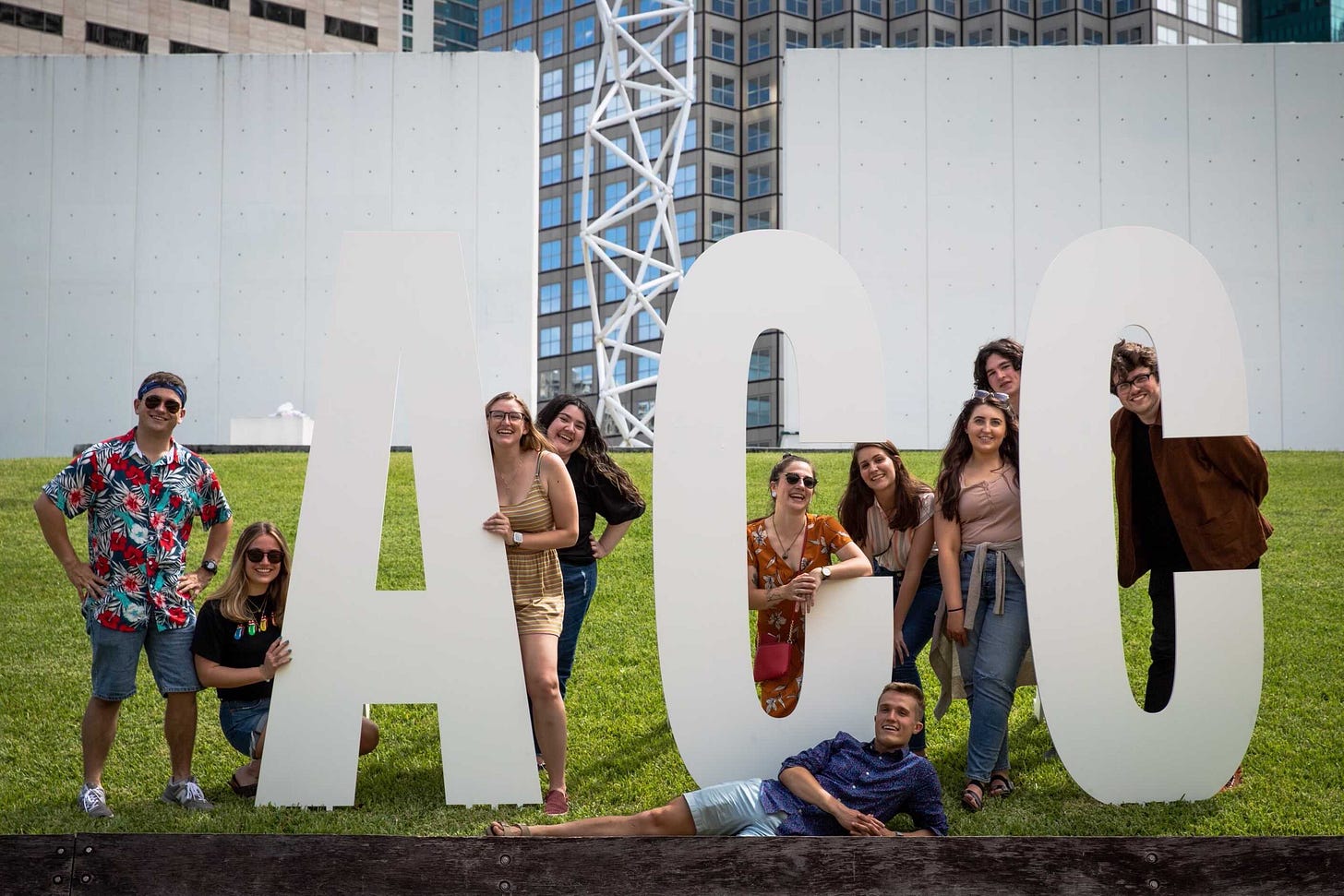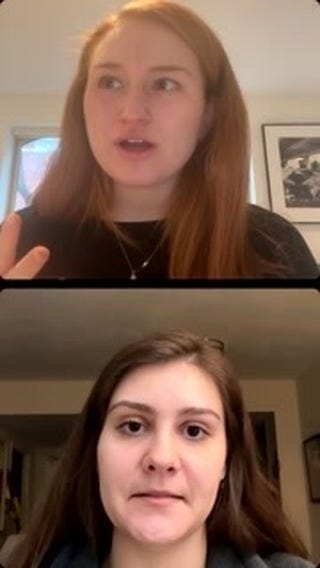The Up and Up Live, a conversation with Karly Matthews of conservative environmental group American Conservation Coalition
Not all climate activists are Democrats. Karly Matthews of the American Conservation Coalition explains how the group is pushing for energy and climate solutions in a divided Congress.

The American Conservation Coalition (ACC) has made a name for itself as a conservative environmental group — showing members of both political parties that not all young climate activists are Democrats.
As the group ramps up its 2023 organizing and plans for its second annual summit, Karly Matthews, ACC’s 25-year-old communications director, joined The Up and Up on Instagram Live to discuss how the group is pushing for energy and climate solutions in a divided Congress with Republican control in the House.
Here are some highlights from our conversation, edited for brevity:
Rachel Janfaza: You have a bunch of big announcements to share from ACC. But first, can you tell us a bit about yourself, where you’re from, and how you first got into environmental work?
Karly Matthews: I’m originally from a really small town in Pennsylvania, kind of an agricultural community. Very rural. But I went to school in Philadelphia and immediately got involved in right of center politics. It really frustrated me, even though I identified as a conservative, that the current conservative movement wasn’t engaging on environmental issues really at all — and when they were it was just not productive or a robust policy debate. When I found the American Conservation Coalition (ACC), I was really, really excited and got involved as a volunteer. Now it’s my full time job.
RJ: When you come across people and tell them you’re a conservative environmentalist, does that confuse people? Are there stereotypes around what it looks like to be a climate or environmental activist?
KM: When I first started this work, yes. It was very much like, ‘Conservative. Environmentalist. What does that mean?’ But I think because of the work that ACC does — and a lot of other groups in this ‘eco right’ space that’s been forming for the better part of 10 years now — I really do think people are recognizing that those values are compatible. And really, there’s nothing more conservative than conserving the environment. [There’s] this idea that conservatives don’t like change, well then we shouldn’t change our environment. We shouldn’t let our environment degrade. I do think there’s a really clear logical path between conservatism and environmentalism.
RJ: Tell us a bit about the American Conservation Coalition at large. Who are you guys, where are you located, and what does the day to day look like for someone who’s involved?
KM: ACC was founded in 2017, so we’re coming up on our 5-year anniversary. We have about 20 full time staff scattered all over the country. I’m here in Washington, D.C., but we have people in the west, in the south, in the midwest. We have branches of activists who are either college students, high school students, or young professionals. We have members in all 50 states and about 130 branches currently.
What my day to day looks like is talking to reporters and folks in the media about our mission, spreading the word about ACC and the work that we’re doing. We have our own approach to climate change called The Climate Commitment. We’re really pushing forward more conservative elected officials to engage on the issues and be leaders, especially now that they’re in the majority in the House.
RJ: You guys just announced your 2023 summit. What is the ACC summit? Where will it be this year? Who are you hoping to attract?
KM: We are so excited. Today’s the first day of full promotion of the 2023 ACC summit — our second annual summit. The last one was held in Washington, D.C. last June. We had over 300 attendees, and really cool speakers from everyone from Governor [Chris] Sununu from New Hampshire, to former Transportation Secretary Elaine Chao, to policy experts. We had celebrity chef Andrew Gruel there. It was a really great opportunity for activists to all gather in one room, network with each other, learn from policy experts and gain the tools that they need to advance these values back in their communities.
This year, we’re headed west, and we’re going to Salt Lake City. Our whole team is so thrilled to get out of the D.C. beltway. Our agenda is still being formed… but we’ll be announcing speakers and panels and activities as the days go on.
RJ: Given your priorities for this year, are there key topics the folks who will be there can expect to hear about?
KM: We do have a policy agenda for the 118th Congress that will guide a lot of the work we do this year and also probably the summit. Those priorities are: permitting reform, nuclear energy, critical minerals, and natural climate solutions. So I think you can definitely expect to hear more about those but also just more general training — whether it’s media training or other activism training — and then hearing from experts. And we’re planning some off-site trips during the summit.
RJ: I’m always seeing on ACC’s Instagram how you’re out in your communities engaging with the environment around you, what will that look like in Salt Lake City?
KM: We are planning some really cool opportunities to get out in nature and enjoy what Salt Lake City has to offer. Last year our schedule was jam packed in Washington, D.C., and this year we definitely want to take time to remember why we do this work.
RJ: At the start of our conversation, you mentioned your priorities for the 118th Congress. Earlier this year, you signed onto a coalition letter of conservative groups urging environmental and energy issue priorities. Can you tell us about that? What role did or will ACC play in the coalition and how will you continue to keep that pressure on in this moment where Republicans have control of the House?
KM: There is this group of conservative environmental organizations or market based environmental organizations from Clear Path to Citizens for Responsible Energy Solutions to more trade groups like the Nuclear Energy Institute that really focus on advancing energy solutions that the market supports and that we can create climate action but also bolster the economy and make sure that we’re doing both in tandem.
The role that ACC really plays in these coalitions is that one, we bring the young conservative perspective and make sure that we’re advocating for who our activists are and what their priorities are. Of course it’s really important to have policy experts weigh in on things like this but it’s equally important to have the millennial/Gen Z perspective heard, and I think that’s what ACC lends to coalitions like this.
As far as keeping the pressure on — ACC is very focused on making sure that we’re top of mind for elected officials and other power players in this space. We want to make sure that our policy priorities are advanced and that climate and energy and conservation are top of mind throughout this Congress.
RJ: What is one of your top concerns as it pertains to how young people are involved in this conversation? And have there been any generational divides that you’ve found within this coalition?
KM: Honestly we have a really strong coalition — I don’t think there are any big divides between what the priorities are for us and a more policy oriented think tank sort of organization. But I do think it’s really important that these younger generations get involved in initiatives like this. I know that kind of the instinct is to join rallies or protests, and I think that those can be effective, but I also think playing the political game and making sure that you’re top of mind for elected officials in a way that isn’t just ‘Oh yeah, that’s the group that protested outside my office last week,’ but it’s also like, ‘That’s the group that wants to be involved in the policy making process and came to the table in good faith.’ So I think that’s something that’s really guided ACC’s activism.
RJ: We’ve covered a lot. But what have we missed?
KM: There’s been a lot of chatter about whether climate will be a priority in this Congress, because it is a divided Congress and a divided Congress is associated with grid-lock and nothing getting done. But I really want to urge young people especially to not throw in the towel, regardless of who’s in charge in Congress, who has the White House. I think it’s really important to be able to work with anyone. Climate change isn’t going to suddenly stop just because we don’t have the perfect political climate to tackle it… Even if you don’t think it’s the best political environment for climate solutions, you might be surprised because I think Republicans in the House are actually really motivated to tackle this issue and want to do so in a largely bipartisan way. Obviously there are things that Republicans and Democrats don’t agree on, but I have a lot of faith that there will be bipartisan compromise in this Congress, and I think young people will be a driving force in making that happen.
RJ: Along those lines, are you working with groups across the ideological spectrum on the issue of climate?
KM: Yes. Always. We are a right of center group, but we never shy away from entering a room where there will be disagreement. We just hosted roundtables yesterday with a diverse group of organizations, and we will continue to do that sort of work to make sure that we’re acting in good faith too and we’re hearing the more progressive or liberal perspective and seeing where we can compromise.
Watch our full conversation here:




